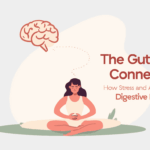8 Tips for Better Digestion In 2026
Our digestive system works tirelessly behind the scenes to break down the food we eat, absorb nutrients, and eliminate waste. Despite playing a crucial role in our overall health and well-being, digestive health is often overlooked until something goes wrong. This blog will provide tips and tricks to keep your digestion running smoothly.
Gas, bloating, constipation, diarrhea, heartburn, and abdominal pain can often be a result of digestive dysfunction. A significant part of my private practice involves helping patients with digestive difficulties, and I’d like to share some of the things I’ve learned over the years with you. The tips touch on various aspects of digestion, such as diet, exercise, and mental health. This isn’t a comprehensive
list, but it highlights some key points that can make a big impact.
Don’t Overeat
Eating too much food, regardless of what it is, can lead to digestive problems like gas, bloating, and diarrhea. Another important aspect over overconsumption is meal timing. Chronobiology, the study of daily cycles in humans, suggests that many of our body functions, including digestion, start shutting down as the day goes on. Since our metabolism is more active earlier in the day, we should focus on eating more in the morning hours and less as it gets closer to bedtime. Lastly, It’s often easy to overeat when dining out because we don’t know how much butter, oil, and other high-calorie ingredients are in our food. Cooking and eating at home more often allows you to tailor your diet and caloric consumption based on your individual needs.
Eat and Move
Have you ever tried walking or rebounding after a meal? A quick 10-15 minute walk after meals can improve blood flow to the digestive tract and help promote muscular contractions in our gut, allowing food to pass through more easily. If you experience indigestion, gas, or bloating after meals, try walking or rebounding for a few minutes.
Balance Sweet and Bitter Foods
We consume more sugar and sugar-rich foods than ever before, which can take a toll on our health. Excess sugar consumption not only takes up space in our diet for healthier and more gut-friendly foods but also leads to weight gain, which can affect digestion.
When was the last time you had some kale, arugula, dandelion greens, bitter melon, 100% cocoa powder, black coffee, or green tea? These foods contain bitter compounds, and we often shy away from eating bitter foods despite their digestive benefits. Bitter foods stimulate the release of digestive enzymes, helping to break down food and move it through the gut. Try to consume at least 1-2 servings of bitter foods each day and pay attention to the ratio of sugary to bitter foods you consume. When in doubt, bitter is better.
Consume a Diet Rich in Fibre and Probiotics
Probiotics are beneficial bacteria that, when taken in adequate amounts, provide health benefits, especially for the digestive system. They can be found in foods like kombucha, yogurt, kefir, kimchi, sauerkraut, and probiotic supplements. Sufficient probiotic consumption can help boost the immune system, reduce the severity of allergies and eczema, enhance nutrient absorption, and support mental health.
Probiotics feed on fibre to help them grow in numbers. Adequate fibre intake is necessary for a healthy digestive system. Aim to get roughly 30-40g of fibre per day. Some foods that are high in fibre include fruits, vegetables, legumes, nuts, seeds, and whole grains.
Ensure Adequate Hydration
This one is pretty self-explanatory. The average adult body is composed of up to 60% water. Water helps facilitate digestion, absorption, prevents constipation, supports stomach function, and can reduce heartburn and acid reflux. Depending on activity levels, you want to aim for 6-10 cups of water per day. It’s important to remember that most food also contains water, contributing to your daily total, as do tea and coffee.
Avoid Eating CRAP
CRAP stands for Calorie Rich and Processed Foods (I wish I came up with this). Consumption of CRAP can lead to digestive difficulties. Eating some processed foods occasionally is okay and is encouraged for long-term adherence to a healthy diet and lifestyle. You can try applying Pareto’s 80/20 principle to your diet: eat whole foods 80% of the time and processed foods 20% of the time as a treat.
Manage Your Mental Health
Good mental health can greatly benefit your digestive processes, while poor mental health can hinder them. Chronic stress and anxiety can release hormones that either speed up or slow down digestion, leading to gas, bloating, and changes in bowel habits. Mental health issues can disrupt communication between the gut and the vagus nerve, which sends relaxing messages to the body, potentially leading to diarrhea. Mood disorders can contribute to or worsen conditions like IBS (irritable bowel syndrome) and IBD (inflammatory bowel disease).
Consult a Naturopathic Doctor
There’s a lot of conflicting medical information online, making it difficult to make sound health decisions. When in doubt, seek guidance from a professional. You probably wouldn’t try to be your own accountant or lawyer, so why try to be your own doctor? I’m currently accepting new patients and would love to offer you a helping hand to improve your health. Book a free 15-minute consultation with me to see if Naturopathic Medicine is a good fit for you. See you soon!
Follow me on Instagram @sanamarora.nd for more health and wellness tips






